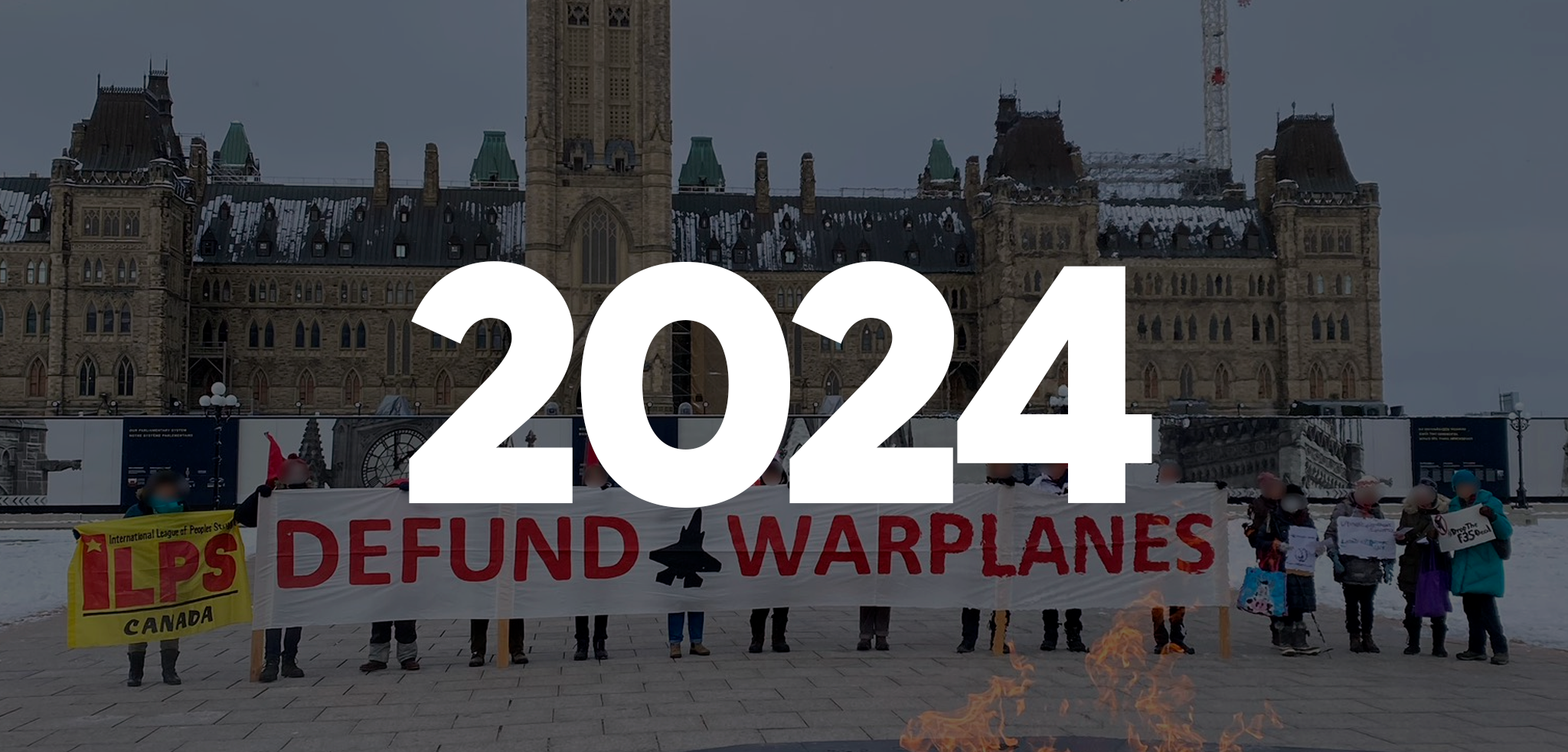The year 2024, which has just ended, is part of a major turning point in our lives: the world is becoming increasingly divided, both internationally and within countries. This division reveals more and more that the oligarchy has lost control and no longer has the means to keep the working class quiet. Canada is no exception to this trend, with numerous strikes, the dubious political choices of its governments and the increasing repression of popular opposition.
So, how will the major events of 2024 influence the future of workers in Canada?
Internationally: No cause for reassurance
Imperialist tensions
In recent years, tensions have been rising between the Sino-Russian bloc and the U.S.-European alliance which includes Canada. The past year has seen an intensification of proxy conflicts, where major powers support other states or groups to fight in their place.
The fall of Bashar Al-Assad in Syria, who was backed by Russia, is a case in point. The ongoing war in Ukraine is another. We have also seen internal tensions in Georgia and Moldova, reflecting the conflict between NATO and Russia.
It is also impossible to ignore the ongoing genocide in Gaza. 2024 saw the expansion of Israeli aggression into Lebanon, increased tensions with Iran and an international arrest warrant for Prime Minister Netanyahu. In the midst of the storm caused by the invasion of Gaza, Israel's allies continued to finance the massacre, despite some timid denunciations. For their part, the United States reiterated its support for the Israeli regime in order to defend its foothold in the Middle East, while Russia sided with Iran.
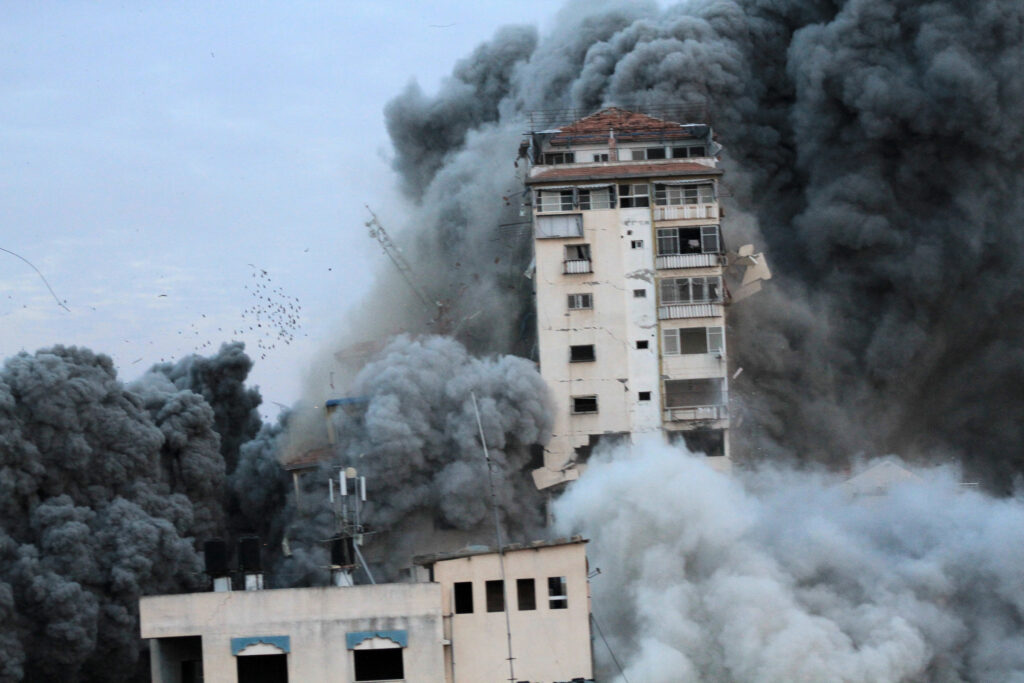
Canada on the international stage
Canada's ruling class continued this year to plunder economically and intervene politically in other countries. Among other things, its highly profitable arms exports support some very controversial regimes.
For example, the Canadian oligarchy profits from arms sales to the Israeli army, used in the genocide in Palestine. It also sells arms to the Peruvian government, which violently represses demonstrations in the country, killing dozens of people in 2024. Ottawa supports Peru's coup d'état regime to protect Canadian mining interests in the country.
The Canadian mining sector is present all over the world and often violates human rights. Philippine solidarity organizations reported this year that the Canadian oligarchy owns $843 million in investments in that country's mines. The sector is allegedly linked to the murder of 281 activists since 2012, according to the NGO Global Witness. In Haiti, the Canadian government this year supported the deployment of troops to impose a government favourable to its interests, particularly in the mining sector.
The return of the Conservatives
On the political front, 2024 marks the continued rise of the conservative right internationally. Trump's comeback in the United States and the rise of the Rassemblement National in France, the AfD in Germany and Pierre Poilievre in Canada confirm a search for an alternative to liberalism and globalization and the worsening of social inequalities.
Pro-Palestine demonstrations
Finally, pro-Palestine demonstrations in Canada were a major story this year, with rallies of thousands of people taking place across the country. Even more striking were the student encampments at Canadian universities, some of which lasted all spring. Despite facing repression, these encampments succeeded in maintaining media attention on the ongoing genocide in Gaza.
Rights and freedoms: divide and conquer
Repression
Recent events surrounding Palestine show an increase in repression and dissent in Canada. The oligarchy and governments are preparing for the possibility of widespread war, and are increasingly limiting freedom of expression to what suits their local and international interests. The arrest of a demonstrator carrying a flag of the Popular Front for the Liberation of Palestine (PFLP), subsequently charged with incitement to hatred, is a case in point.
Similarly, several teachers have been suspended or dismissed for their support of the Palestinian resistance. Such is the case of Natalie Knight, targeted by the Minister of Education in British Columbia. The Toronto District School Board has also launched an investigation into teachers on this subject.
Even more striking, the organization Samidoun, which supports Palestinian political prisoners, was added this fall to the list of groups considered by the Canadian government to be terrorist organizations.
Finally, the arrest of three people and a few broken windows at an anti-NATO demonstration this fall created a media circus. Yet this kind of demonstration is more or less common in Montreal. What was out of the ordinary, however, was the reaction of the politicians. The police looked surprised at the chaos and claimed to have the situation under control.
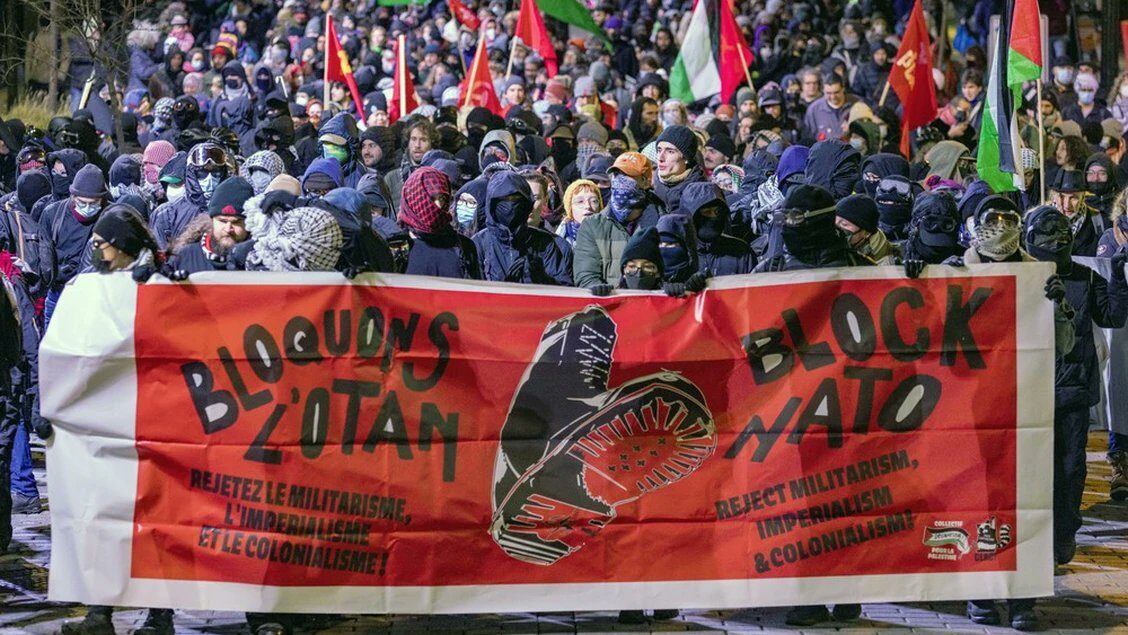
Right to housing
In fact, that Montreal demonstration seemed to be one of the only things under control in 2024. Rents continue to explode, and homeless encampments return year after year and inevitably end up being destroyed by police and city workers.
In Toronto, police cleared a neighbourhood of homeless people to make the city look good during Taylor Swift concerts. Meanwhile, luxury condo towers are springing up, accounting for the majority of new housing in major Canadian cities this year.
In 2024, Quebec abolished the transfer of leases de facto. Previously, a tenant could transfer his or her current lease to someone else, under the same conditions. This limited rent increases, as landlords could not raise prices with every departure. Today, they can refuse a transfer without justification.
At least Quebec tenant groups have won an important victory. The CAQ government has agreed to suspend renovictions for the next three years. On a smaller scale, tenants in Toronto have demonstrated once again that resistance can lead to victory. The residents of 71, 75, and 79 Thorncliffe Park Drive in the east end of the city have been on a successful rent strike for over a year to denounce abusive rent increases imposed by their landlord.
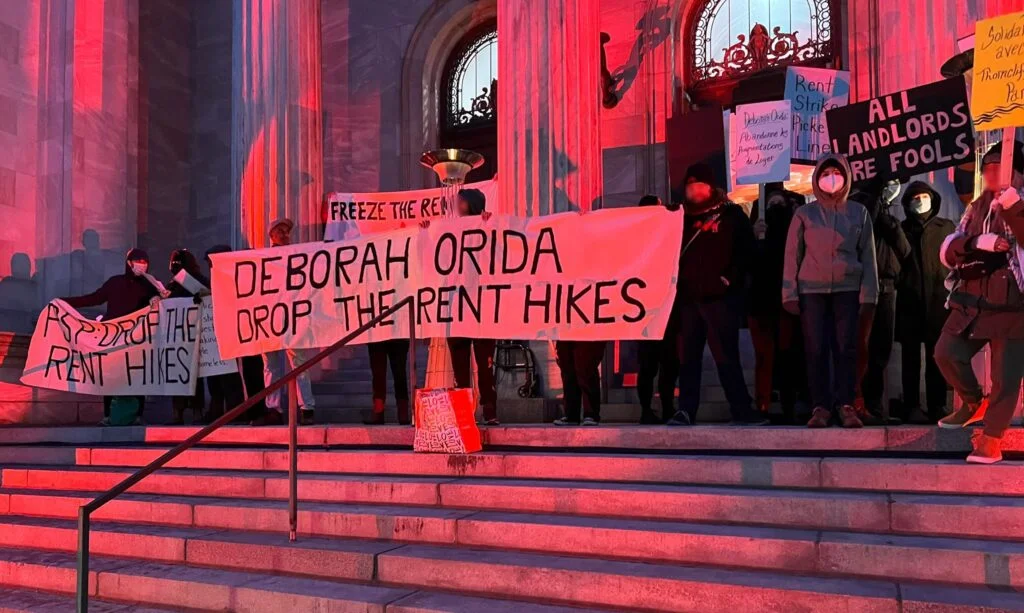
Natural disasters
The authorities didn't seem to have any more control over weather and climate disorders. Forest fires in British Columbia once again wreaked havoc. On the other side of the country, flooding in Montreal turned the city upside down, and many workers had to fight with their insurance companies for reimbursements. The year 2024 was the warmest on record.
Social fabric
Unable to control the economy or the population, the ruling class continued this year to blame the public for all its problems. In British Columbia, for example, “drug addicts” were elevated to a major issue in the provincial election.
Elsewhere in the country, governments decided to single out immigration as the main cause of the housing crisis, to avoid reflecting on the root cause of the problem. Meanwhile, in Montreal's working-class Mercier-Hochelaga-Maisonneuve borough, the mayor decided to blame the poor and the general public for the city's insalubrity after adopting a major spacing of garbage collection. Naturally, the public quickly turned against him.
Labour: attacks and counterattacks
The right to strike
In 2024, one of the oligarchy's main targets was the right to strike. Remember that in 2015, the Supreme Court declared that the right to strike is protected by the Canadian Charter of Rights and Freedoms. Yet the federal government apparently has little regard for this right.
Faced with the difficulty of passing back-to-work legislation, the government invoked section 107 of the Canada Labour Code three times this year, having used it only five times in 25 years. This section allows the Minister to ask the Labour Relations Board to “take the necessary measures” to resolve disputes. Vague and contested by the unions, it has served to deprive rail, postal and port workers of their constitutional right.
In British Columbia, employers increasingly used the “essential service” designation to try to prevent strikes. This was the case for the Coast Mountain Bus Company supervisors' strike in February. The same threat was used against teachers in Quebec unionized with the FAE who were on unlimited general strike at the time.
Finally, in Quebec, Amazon made a constitutional challenge to the Quebec Labour Code. Quebec's labour tribunal rejected their complaint.
Work “flexibilization"
In 2023, the Common Front of Quebec public sector unions brought the issue of "flexibilization" to the forefront. 2024 has seen governments and corporations continue this trend of attacking job security and worker stability. These employers see the Ubers and Amazons of the world thriving and are doing their best to copy the organization of labour that makes them so successful.
The Quebec government has adopted health care and construction reforms along these lines. The health care sector will be more centralized, unions will be weakened, and the forced movement of staff between institutions will be easier. In construction, the requirement to hire local workers has been eliminated, hitting remote regions particularly hard. Workers could also be forced to perform tasks for which they are not trained.
Canada Post also wanted to make its workforce more flexible. The Crown corporation requested that the union to allow it to create positions with only eight guaranteed hours per week but which could be extended to 40 hours, depending on the company's needs. Canadian National Railway wanted to remove several clauses in its employment contract dealing with rest and fatigue. The rail monopoly wanted to make its employees work longer, whenever it wanted.
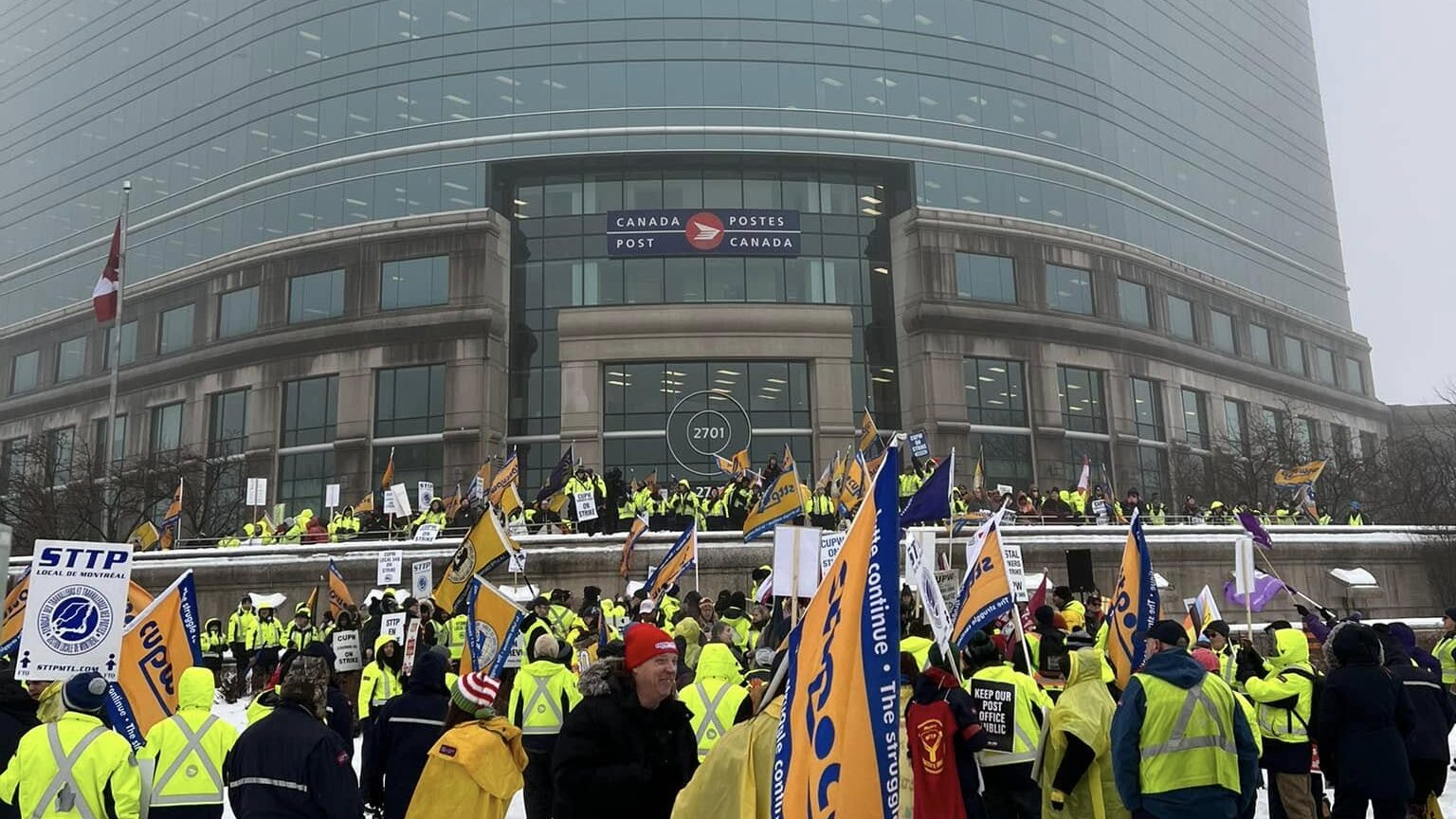
Counterattack
As governments went on the offensive in 2024, workers fought back. Unions have formed at two companies that symbolize of ultramodern work organization and are known for their poor conditions: Walmart in Ontario and Amazon in Quebec.
2024 was punctuated by over 700 work stoppages. Although not all strikes were successful, workers held their ground to obtain better conditions. In the case of some school bus drivers in Quebec who were being paid close to the minimum wage, their perseverance enabled them to obtain almost a 10% annual increase!
Democracy and politics: the workers ignored
Federal circus
The past year has been a complicated one for both the Liberals and the NDP, as they both failed to counter the rise of Pierre Poilievre and his Conservatives. The latter are now leading in the polls.
One of the biggest political controversies of the year was that of Chinese foreign interference in the 2019 and 2021 federal elections. The Asian superpower is accused of trying to make conservative candidates who are hostile to it lose.
In 2024, the debate turned absurd: Poilievre continued to refuse security clearance to read the secret service report, preferring to rely on speculation. Trudeau again acted as if there were no problem, and Singh's support for the Liberals continued to blur the lines between the two parties.
Through it all, publicly available information suggests that both Liberals and Conservatives were “influenced.” And that's without taking into account the economic and political influence of the United States, which is already evident, but which nobody is talking about. To the parties in power, the most important thing doesn't seem to be whether the public's votes counted, but rather who influenced them.
Finally, in September, the NDP ended its alliance with the Liberals, but it's too little, too late. Their divorce will precipitate an early election, probably this winter.
Mishandling of public funds
Each additional year represents tens of millions of dollars misspent, taken directly from workers' pockets. 2024 was no exception.
In Quebec, the government gave the Los Angeles Kings $7 million to come and play two preseason games in the provincial capital. The Premier bought himself an NHL jersey worth $1,282 with public money. In Montreal, the transit authority bought 18 unreliable electric Mustangs for its executives. In Ontario, MPPs increased subsidies to their own parties by millions of dollars. Doug Ford's administration is also recognized as the one that pays its top civil servants the most.
In return, the austerity of the early 2010s seems to be resurfacing. Governments are starting to cut wherever they can. That's the plan of Poilievre's Conservatives. Quebec is already seeing unprecedented cuts to the health care system and schools.
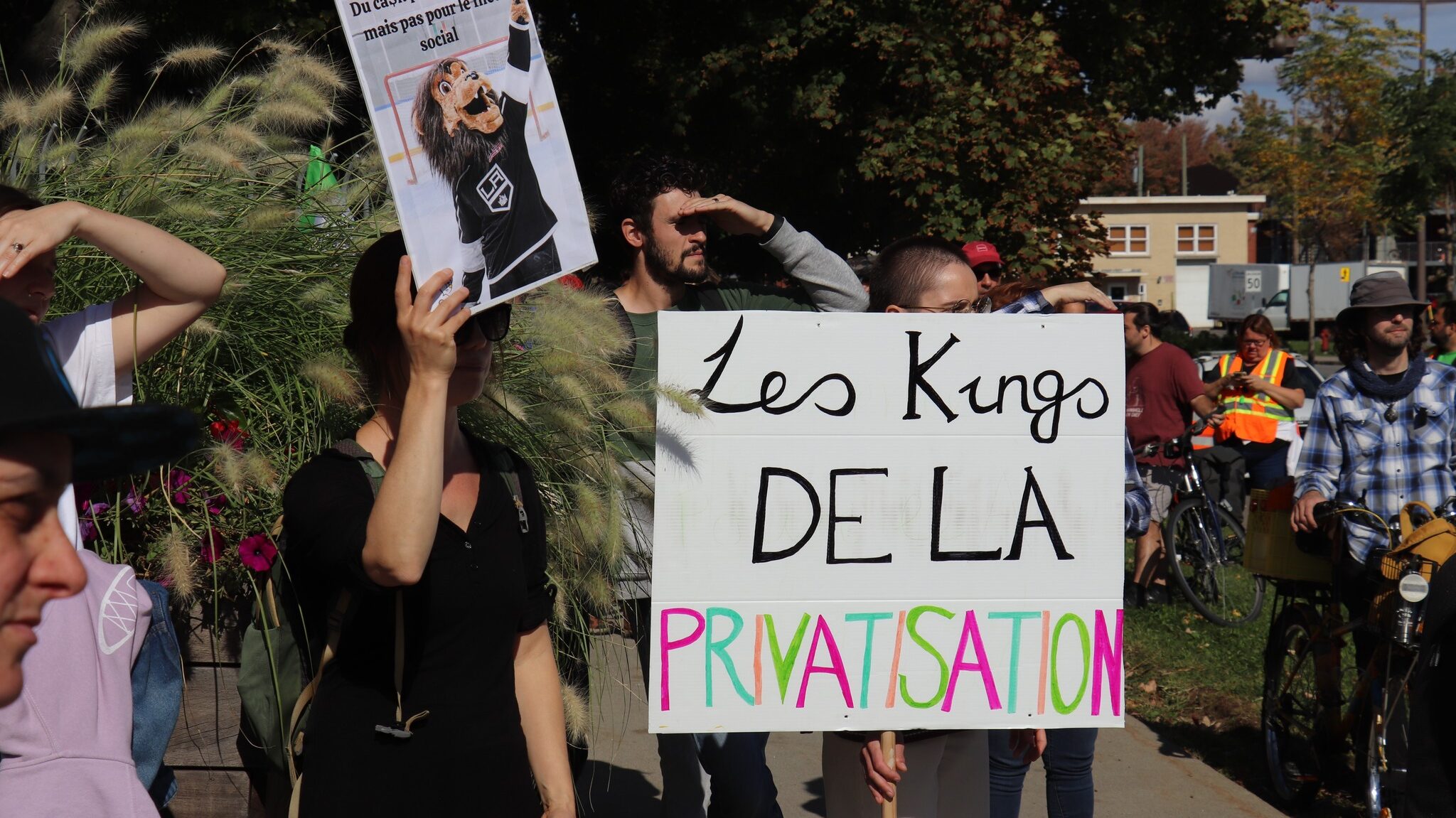
The State and its big business friends
The year 2024 continued to reveal the allegiance of provincial and federal governments to big business. In Quebec, the government tried to save their friends at Lion Electric and Northvolt—two companies in major decline in which they had invested millions of dollars of public money.
What's more, following health care reforms that created the Santé Quebec agency, the Quebec government appointed a board of directors drawn from the province's small oligarchy. Executives from banking, private health care, and hotels are represented, but no workers.
In Ontario, the LCBO strike revealed the extent to which its board of directors was filled with wealthy bosses. Even the cousin of Canadian grocery magnate Galen Weston has a seat at the table!
But no one will do as well in this category as Donald Trump in the United States. Of course, Joe Biden's cabinet already included the upper crust of wealthy Americans, with combined holdings of $100 million. However, the returning U.S. president-elect has assembled a cabinet with a combined value of at least $550 billion. The new, unelected American co-president and tinpot dictator of Twitter, Elon Musk, is responsible for around $430 billion of that.
Oligarchy: enjoying life to the fullest
Let's start with a quick mention of Arthur Irving's passing in 2024. After a golden retirement, the member of the Maritime provinces' monopoly dynasty leaves his empire to his children, who won't have to worry about prices at the grocery store.

Grocery stores make quite a profit
In fact, grocery prices continued to rise faster than inflation in 2024. It was revealed this year that two Canadian potato giants had formed a cartel with two American companies in 2021, causing prices to rise by 87% since then.
Shrinkflation has also caused havoc, resulting in reductions of between 5% and 25% in quantity (while maintaining the same price) for many staples such as cereals and cheese.
Crimes of no consequence
In 2024, large companies continued to reap profits without worrying about their impact. In Ontario's Chemical Valley, one plant was repeatedly denounced for poisoning a First Nation community. In Quebec, Northvolt sheltered itself from creditors after extorting $710 million from Quebec workers.
In the United States, Boeing has put thousands of lives at risk by cutting its maintenance and quality control budgets. The images of landing gear and doors falling off mid-air have left a lasting impression. Incidentally, the recent crash in South Korea involved a Boeing aircraft. Experts doubt that a collision with birds, the explanation put forward by the monopoly, was the sole cause of the accident.
Choices to be made
In 2025, the public will still have to contend with the media offensive waged by governments and the oligarchy. The mainstream media have distorted all kinds of subjects over the past year.
For example, coverage of the anti-NATO demonstration in Montreal in November portrayed it as a huge, unacceptable pro-Russian event. Yet the calls for the demonstration clearly stated their opposition to Russia and China as well as the Western politico-military alliance. Meanwhile, the mainstream media lashed out at Canada Post workers, presenting mainly the negative effects of their strike on small and medium businesses.
The newsrooms of the major media tend to repeat the government's communication elements. They are currently engaged in increasing support for a larger-scale war, seeking to convince people that the American oligarchs and their allies are the “good guys” camp in a conflict where neither side really is good. At the same time, they minimize the disastrous consequences an open war would have on the populations of the countries involved.
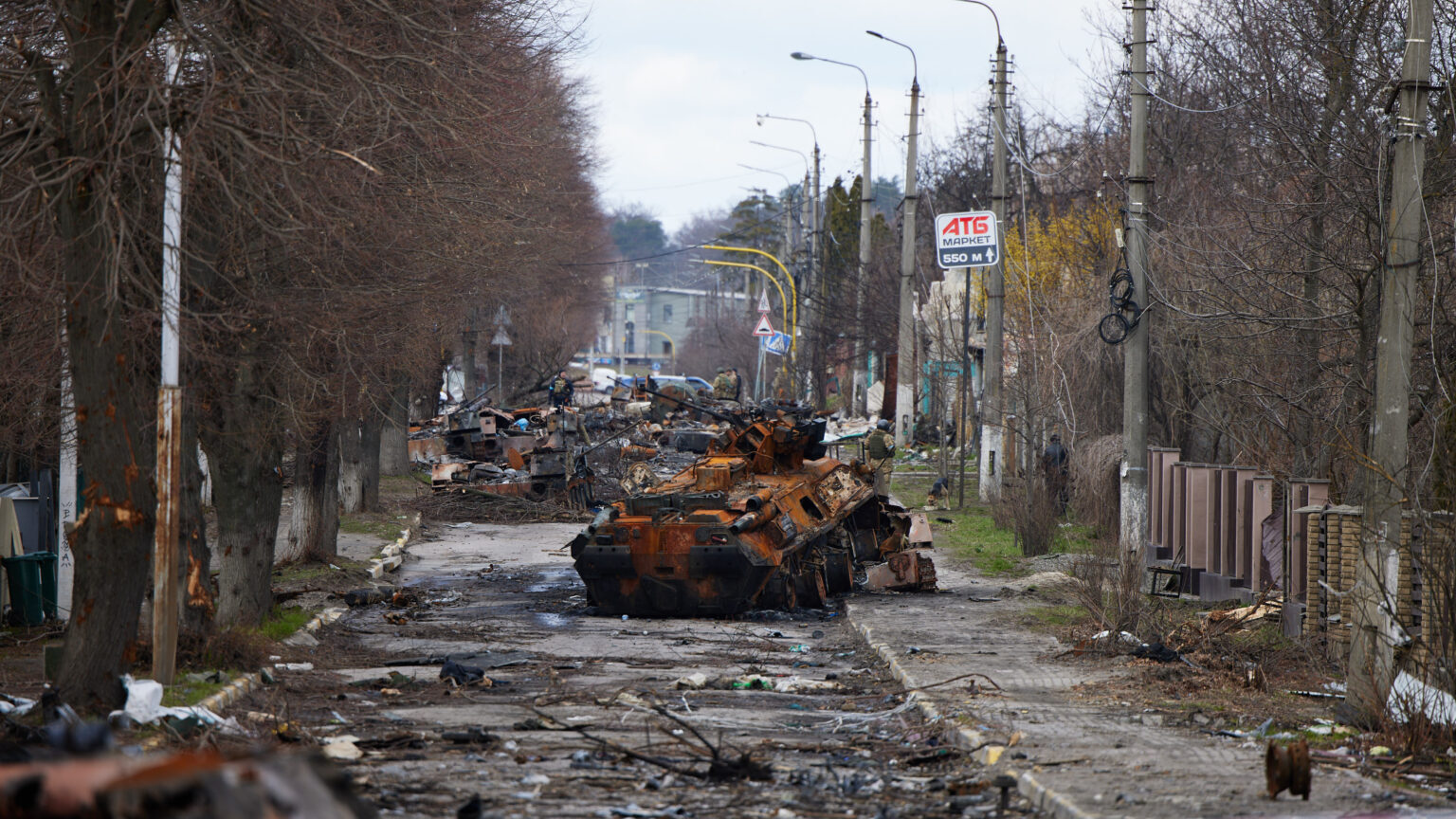
Fear of revolt
The oligarchy and governments are ramping up their propaganda efforts in advance, because they know that if they don't, the population may well revolt. An RCMP report released earlier this year acknowledges that there is a growing risk of a popular uprising.
And the RCMP is right to be concerned. A June poll estimated that 70% of Canadians consider the country to be "broken.” Food Bank Canada reported 2 million visits in March alone, a figure sure to rise by 2025. Experts estimate that a family of four will see its annual spending on groceries increase by $800 by 2025.
Some people are already starting to revolt, but the public is faced with a choice. The first option is the individual act, of which there have been several striking examples this year (especially in the U.S.). Think of Luigi Mangione, the alleged murderer of the CEO of UnitedHealthcare, who openly declared his intention to attack the American private health care system. Or the two assassination attempts on Donald Trump.
The second choice is collective action. The pro-Palestine protests are an example of such action, as is the boycott of Loblaws earlier this year. These actions made noise, but had limited effect.
The major strikes in the logistics sector, however, gave a glimpse of what several thousand people could achieve if they joined forces to cut off supplies to the ruling class. The strength of these actions lies in their economic weight and the concerted action of so many workers. Indeed, some groups are beginning to suggest that they could be used for political leverage.
So, what can we expect in 2025? Dissent and resistance, to be sure. But how? The public has that choice in their hands.


